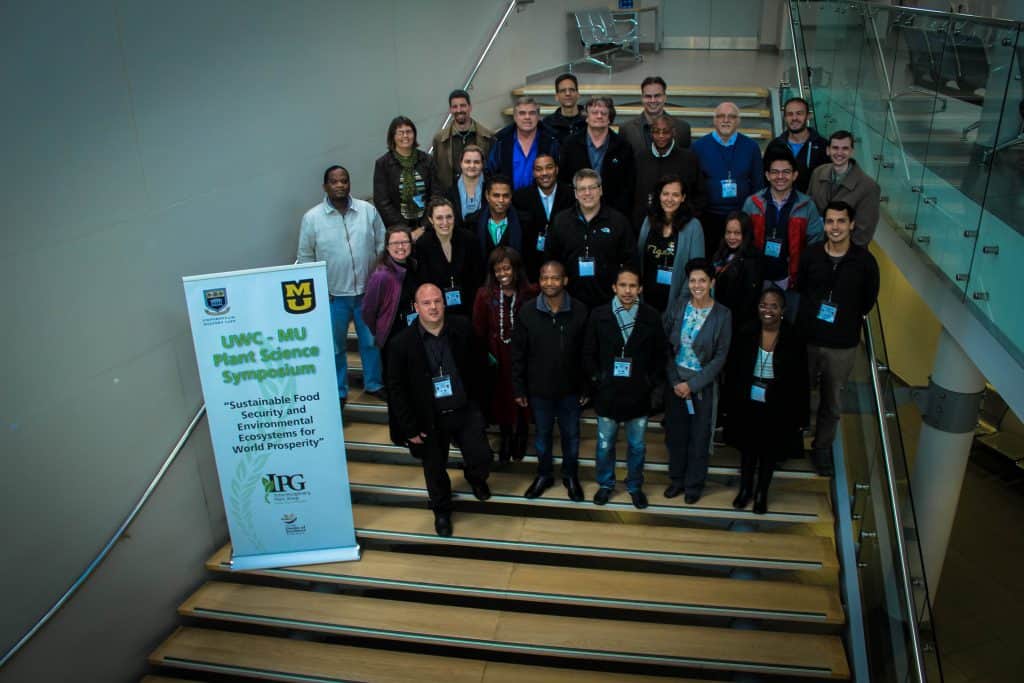
As governments and scientists around the world grapple with issues of food security resulting from the shocks of climate change, the Universities of the Western Cape (UWC) and Missouri (MU) have come together to host the first UWC-MU Plant Science Symposium to look at cutting edge plant science research as a means to mitigate the effects of climate change.
Themed Sustainable Food Security and Environmental Ecosystems for World Prosperity, the symposium focuses very specifically on the abiotic and biotic stresses that plants are exposed to, and how this affects food security and environmental sustainability.
The event, featuring researchers from around South Africa and the US, was organised with support from the Centre of Excellence in Food Security (CoE-FS), co-hosted by UWC and the University of Pretoria.
It is widely agreed that climate change poses a very real threat to food security. In response, scientists across the globe have been looking at all manner of science-based solutions, as is the case at the UWC-MU Plant Science Symposium, hosted at UWC from 15 to 17 June 2015. The symposium’s more than 30 presentations is a celebration of cutting-edge plant science research.
Prof Julian May, Director of the CoE in Food Security set the backdrop for the symposium, painting a picture of the state of food security in South Africa
In particular, the presentations looked at how plants respond to a range of abiotic and biotic stresses – i.e. stresses caused by, respectively, non-living and living factors such as drought (a particular concern as water scarcity becomes a global issue), heat, salinity (high salt levels in soil), insects, fungi and bacteria. To this end, scientists have been homing in on a selection of genes, proteins, and biochemical, physiological and molecular processes that control plant responses to these stresses.
Boasting an enviable track record in fundamental plant science – specifically around major Missouri crops like maize and soybean – the US university is keen to identify areas where they can apply that fundamental knowledge on a broader canvas. Professor Robert Sharp, director of MU’s Interdisciplinary Plant Group (IPG) says collaborations such as the one with UWC allow scientists to, on an international scale, draw greater attention to issues of food security and water scarcity. “This is an opportunity to link up with colleagues in other countries – in this case Southern Africa – and to put our minds together and make more rapid progress in this regard.”
Presenting the science against the backdrop of food security is also in keeping with the interests of symposium co-sponsor, CoE-FS.
”It was a chance to bring together people in these highly specialised fields into one place to talk about what is a very important topic,” said Professor Julian May, co-director of the CoE-FS, who provided delegates an overview of the food security landscape in South Africa, and the broad range of work being supported by the Centre. “International partnerships are important to what we’re trying to do in the Centre of Excellence; they allow us to bring resources that are not necessarily available to South Africans, and allow us access to those.”
UWC and MU have a relationship that dates back nearly 30 years to, officially, 1986. But the collaboration around plant science rings in a host of fresh new prospects for joint research ventures, networking, and exchange opportunities for scholars and graduate students from both universities, said Professor Ndiko Ludidi, group leader of the Plant Biotechnology Research Group at UWC. But more importantly, it allows the universities – whose work in the field overlap and complement each other – to jointly address a major global concern, he added.
So if we bring those commonalities together and, of course, our different levels of expertise and different approaches, we can really advance plant science research to new levels. The kind of impact we can make in science and in society in general would benefit substantially from this kind of international collaboration.
related Articles
Poor have borne the brunt of “inappropriate” Covid-19 regulations, experts say
The loss of jobs and desperately needed revenue to the state resulting from Covid-19-related restrictions will negatively impact the critical…
How the man-made chemical, nonylphenol, hampers the growth of fresh produce
Study shows nonylphenol reduces plant size and cell permeability in lettuce. Image credit: Getty Images Nonylphenol is a man-made chemical…
Humanities take centre stage at postgraduate conference on food studies
This is according to Professor Desiree Lewis, Principal Investigator of the Critical Food Studies: Transdisciplinary Humanities Approaches Programme, an intra-institutional…



